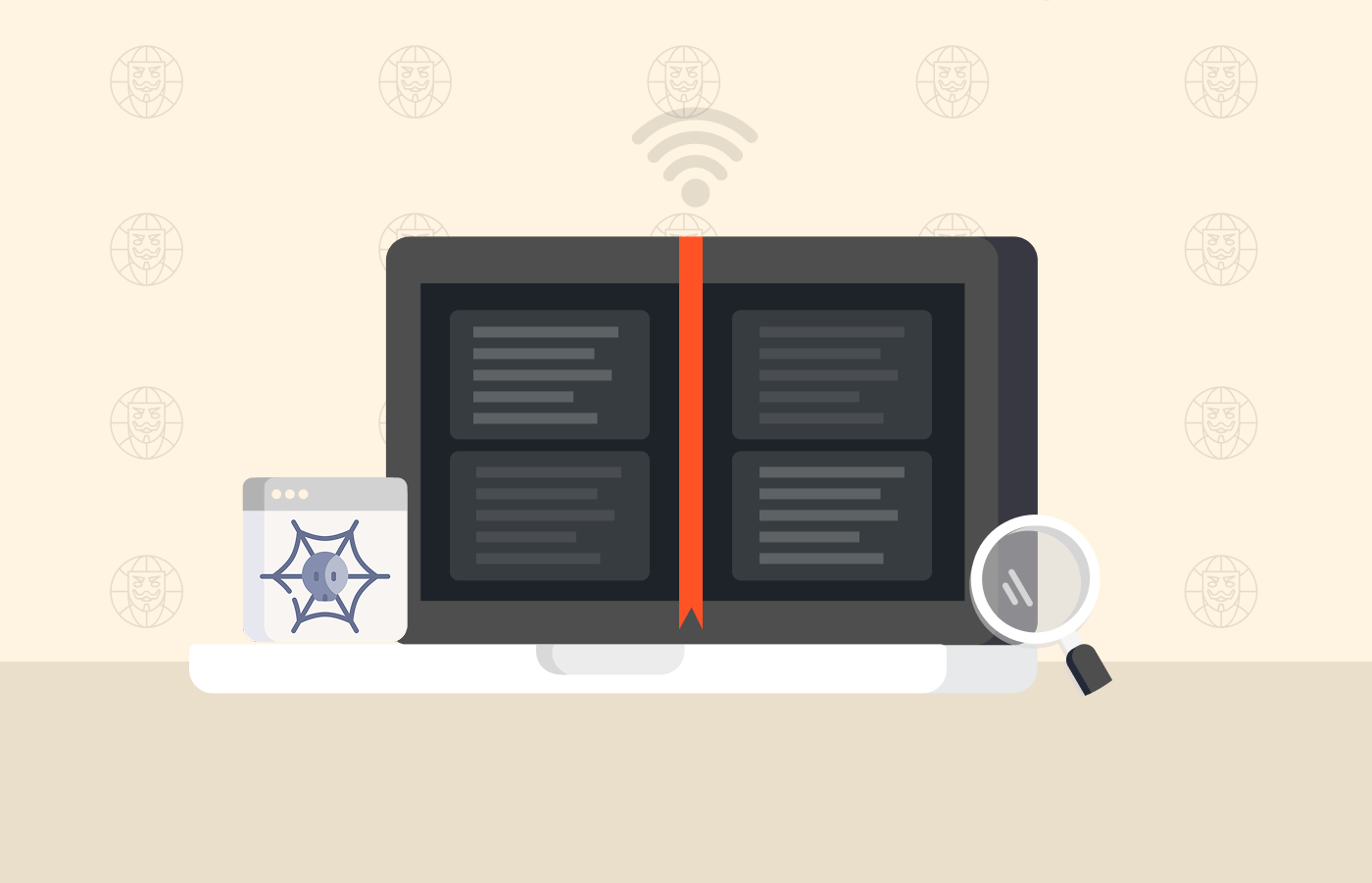In a world where online privacy and accessing anything restricted are becoming complicated, datacenter proxies offer a reliable and affordable way to stay anonymous and bypass digital barriers.
Unlike residential proxies (which route your traffic through real user devices), datacenter proxies use servers housed in data centers. That makes them faster, cheaper, and ideal for bulk tasks like web scraping and market research.
Whether you’re managing multiple accounts or accessing geo-blocked sites, a strong datacenter proxy provider ensures smooth performance and security without breaking the bank. However, the question is how to choose a suitable datacenter proxy?
Don’t fret; after testing dozens, we have compiled a list of the top datacenter proxies to use today. We’ll compare their speed, pricing, IP pool size, and reliability, so you can choose the one that best fits your privacy and performance needs.
Top-notch datacenter proxy providers – Quick list
- Oxylabs: Premium datacenter proxy service with professional customer service and support. Industry leader with the largest IP pool and enterprise-grade features for demanding projects.
- Webshare: Offers flexible plans and customizable self-service with rotating options. Perfect for users who want control over their proxy settings with affordable pricing tiers.
- Decodo: It delivers good performance at a good price, making it great for scrapers on a budget.
- IPRoyal: A straightforward service focusing on dedicated IPs with good geographic coverage.
- Bright Data: Most versatile provider on the market with advanced features. The Swiss Army knife of proxy providers with tools for every conceivable use case.
- MarsProxies: Flexible and affordable, designed for small and medium businesses. Tailored for SMBs with straightforward pricing and reliable performance metrics.
- Rayobyte: Quality datacenter proxies for a wide range of customers and use cases. Offers reliable infrastructure with excellent uptime for both personal and business applications.
- Proxy-Seller: Reasonably priced proxies with good location coverage worldwide. Simple, no-frills approach with solid performance across multiple continents.
What are datacenter proxies?
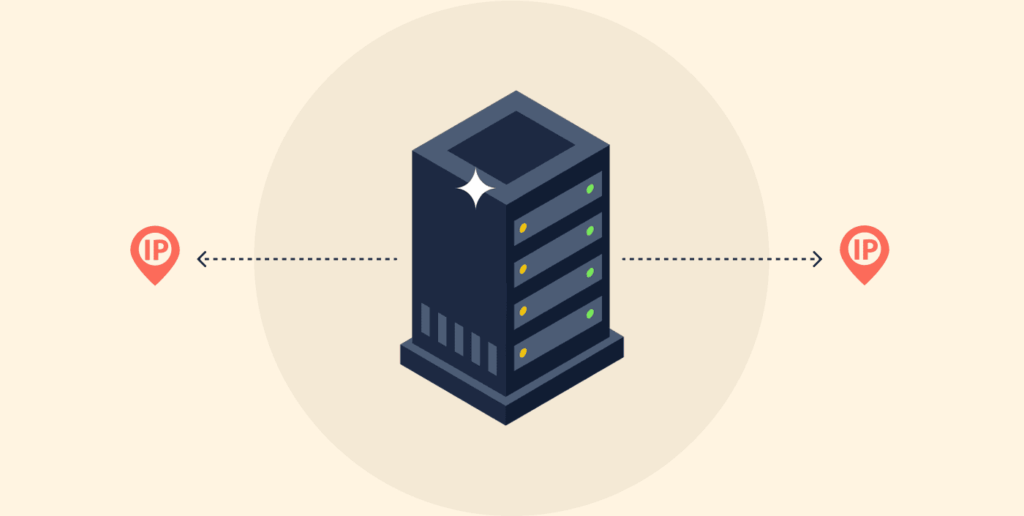
Proxies are essentially remote computers with their own IP address and locations. What happens when you connect to one is that it sends your internet traffic on a detour across a proxy first before reaching any website of your choice.
In other words, it breaches direct access to websites. This process makes it hard for your IP address and location to appear on the radar (almost no chance of IP leaks). Note, though, while they offer a new IP address, they function differently than other privacy tools. For a detailed breakdown, see our guide on VPN vs Proxy, and for maximum anonymity, explore our list of the best dark web browsers to use today.
For privacy and bypassing restrictions, these infrastructures come in handy. This makes them a valuable tool for everyone from researchers to privacy enthusiasts, much like the tools used to access and explore the deep web. Datacenter proxies exist on servers in dedicated data centers. Think industry-grade hardware, multiple redundant internet connections, and climate-controlled environments.
This setup makes them incredibly fast and reliable, often with unlimited bandwidth that would make your home internet jealous. Here’s the catch, though—websites can spot datacenter IPs from a mile away.
Compared to residential or mobile IPs, the chances of blocking datacenter addresses are higher because the websites can’t block real customers by mistake. Nonetheless, datacenter proxies can work exceptionally well on most tasks. But you will find it more difficult with secured domains.
Why? We hear you ask.
They are actively trying to block the use of a datacenter proxy when accessing domains like sneaker sites, Google services, or social media. That being said, do not let that discourage you. Datacenter IPs are still efficient for general web scraping, playing games, automation, and for some business practices.
Why use a datacenter proxy?
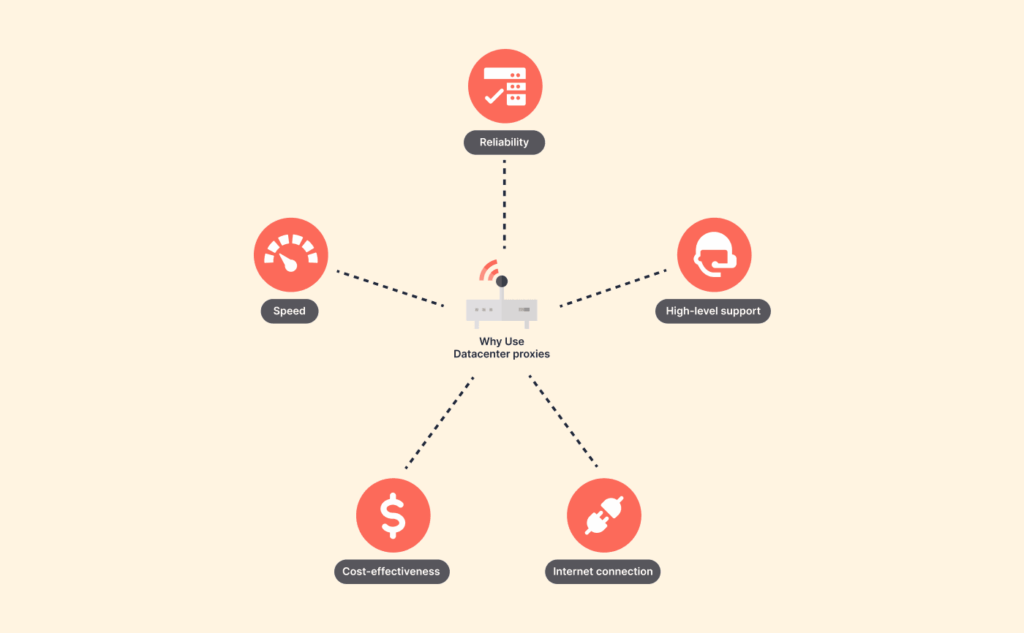
There are multiple reasons why businesses opt for datacenter proxies.
Here are the most important things that actually matter:
- Reliability: When you use a datacenter proxy, you know that you have a reliable internet connection, backed by ample server power and servers located in professional data centers. You won’t need to deal with someone’s home internet going down because they forgot to pay the bill. The reliability means less downtime, and you know that it’s going to be working when you need it the most.
- Speed: Datacenter proxies provide great internet speeds with enterprise bandwidth. Everyone needs this, especially when you are scraping thousands of different pages or want to create an environment for yourself to have real-time data retrieval. Speed is good to have, but it’s a necessity. When you are using datacenter proxies, there are usually no limits on the amount of speed you’d have, meaning you won’t hit arbitrary caps.
- High-level support: The great services provide human support 24/7 to their users, backing most of the infrastructure of proxy services in real time. Not just a chatbot that tells you to restart your computer or clear your cookies. When something goes wrong on your service at 3 AM and you have a project coming due, it’s much more comforting knowing that you have reliable support.
- Cost-effectiveness: Datacenter proxies are typically more affordable than residential or mobile proxies, making them perfect for businesses watching their budgets. You can get started for as little as $0.50 per IP, which is pretty sweet when you need to scale operations without breaking the bank.
Datacenter proxies are ideal for specific tasks like web scraping and automation. If you’re unsure whether a proxy, Smart DNS, or VPN is the right tool for your needs (such as streaming, gaming, or general browsing) our detailed comparison of proxy vs. smart DNS vs. VPN can help you decide.
The best datacenter proxy service providers today – Detailed list
Choosing the right provider from the sea of datacenter proxy providers can feel overwhelming. To allow you to make an appropriate and suitable choice, we’ve tested several services (we have also curated a list of the overall best proxy services to use today in this guide). Each one has its own advantages and shortcomings.
Let’s get into what makes each one great, and where they might just miss the mark.
1. Oxylabs
Oxylabs is arguably the most comprehensive among the top datacenter proxy providers, providing the world’s largest datacenter proxy network with premium service levels. Oxylabs’ infrastructure includes 2 million dedicated IPs as well as over 22K shared addresses, providing you with unlimited domains and connection requests.
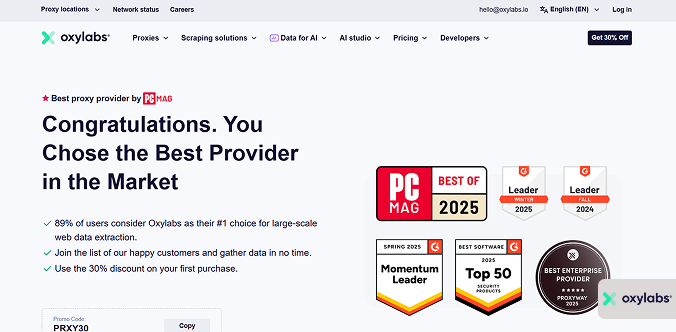
Over 2 million dedicated IPs in 188 countries, giving you unparalleled global coverage along with unmatched diversity in IPs. A 22,000+ shared proxy pool to provide you with an abundant, high-quality, and dynamic pool of IPs for shared use.
Targeting capabilities down to the city level, meaning you can target a specific city location with geo-targeting capabilities. Unlimited bandwidth + unlimited connection requests means you can scale without limits.
- Reliability at an enterprise level
- Advanced targeting and management features
- Exceptional customer support and service
- Complex for beginners
2. Webshare
Webshare is a self-service platform that is highly customizable and uses a flexible pricing model. They offer three distinct datacenter proxy tiers: shared (multiple users), private (0-2 users), and dedicated (exclusive use). Their proxies support both HTTP and SOCKS5 protocols across 50+ countries worldwide.
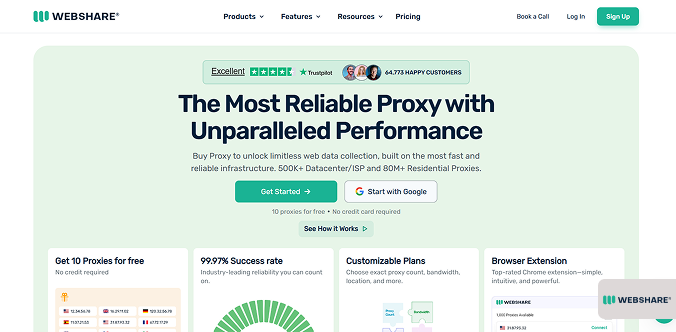
Static IP lists with optional rotation on every request, so you can switch IPs as often as you need (perfect for activities that require frequent IP changes). Customizable bandwidth limits and thread controls allow you to manage your data usage and optimize performance.
It also has location-specific IP selection, letting you target specific geographic regions for your activities. With its IP refresh choices (that range from 5 minutes to 1 month), you can have flexibility in how often you refresh your IPs.
- Highly customizable service options
- Competitive pricing across all tiers
- Free trial available without credit card
- Limited advanced enterprise features
3. Decodo
Decodo, formerly known as Smartproxy, has created a name for itself as one of the best data center proxy providers for web scraping. It delivers affordability and reasonable performance. The provider offers both shared and dedicated datacenter proxies, with transparent pricing and great customer service.
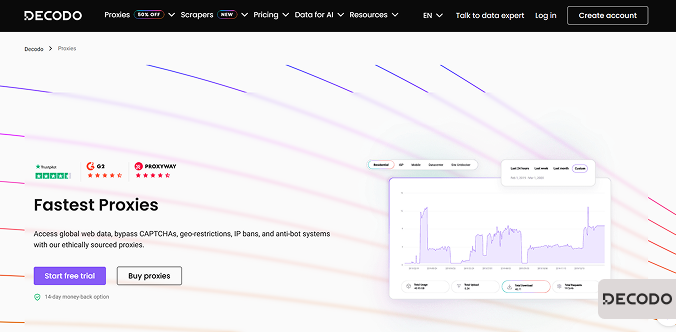
It has over 100,000 shared IPs primarily located in the US and Europe, providing a substantial pool for any project. With IP-based proxies from around 16 countries, you can precisely target specific regions and expand your reach with greater flexibility and control.
With unlimited parallel connections, you can scrape data or run multiple tasks simultaneously without worrying about hitting connection limits. Plus, the optional IP rotation on every request enhances your anonymity and flexibility by constantly switching IPs to avoid detection or bans.
- 14-day money-back guarantee
- Great 24/7 customer service
- Affordable pricing structure
- Smaller IP pool when compared with the premium providers
4. IPRoyal
IPRoyal specializes in dedicated datacenter proxies at reasonable prices and great geographic representation. They keep it simple; not complicated plans or confusing options, just reliable dedicated IPs with unlimited traffic and a proven great service.
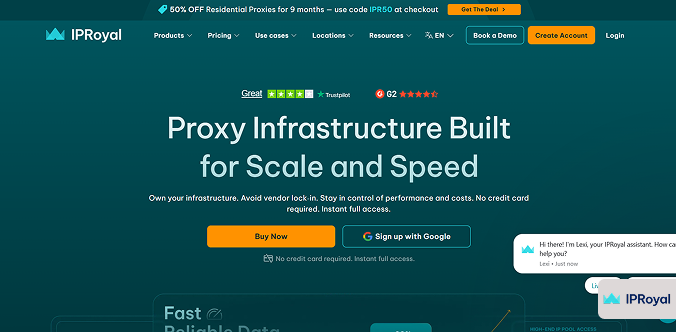
With its dedicated IP from 60+ locations, you’ll get a varied selection of Dedicated IPs for targeting different areas. It also has unlimited traffic and threads (usually perfect for carrying out volume-related activity, such as scraping on many threads).
IPRoyal’s monthly IP refresh changes your IP constantly to keep you and your activities secure. The service also has proxy management API access that allows you to automate your proxies (you can use them and reduce the amount of work you put into managing them daily).
- Good coverage on locations
- Can purchase single proxy
- Simple service
- Very limited in advanced features
5. Bright Data
Bright Data is often called the Swiss Army knife of proxy providers, offering one of the most versatile and comprehensive proxy ecosystems available. Its datacenter proxy network is just one part of a powerful suite that also includes residential, mobile, and ISP proxies, giving users unmatched flexibility for almost any online task.
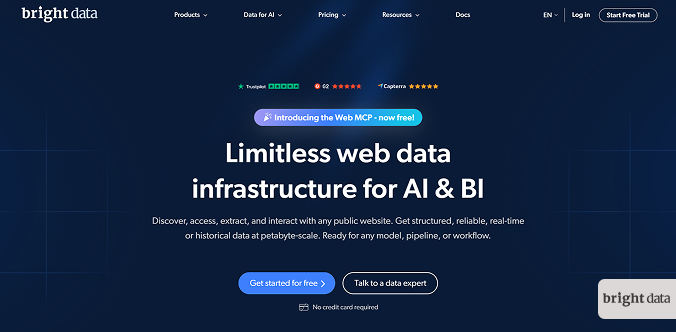
With over 770,000 dedicated datacenter IPs, it offers a huge pool of reliable, unique IPs. It also has around 100,000 shared IPs, enabling even more flexibility, choices, and options.
It comes with an advanced proxy manager tool that makes managing and optimizing your proxy usage effortless. Plus, with access to over 98 global locations, Bright Data ensures excellent geographic coverage and balanced IP distribution for any region you want to target.
- Most versatile provider available
- Comprehensive targeting options
- Excellent uptime and reliability
- Setup is complex with learning curve
6. MarsProxies
MarsProxies caters to small and medium-sized businesses by offering affordable and flexible proxy solutions. The company has handled over 344TB of data across a robust network of more than 334,000 servers, showcasing the strong infrastructure for developing enterprises.
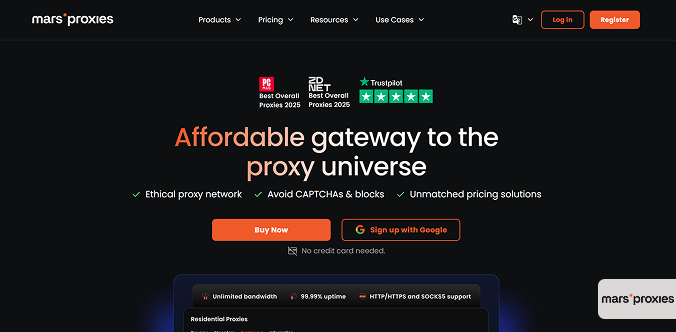
With servers across 37 countries, MarsProxies offers one of the largest and most diverse IP networks available. It supports five different proxy types, including datacenter proxies, giving you the flexibility to choose the best option for your specific goals and use cases.
Dedicated proxy servers come with unlimited bandwidth, allowing you to scale your operations without any restrictions. With an impressive 99.9% uptime, you can count on consistent reliability and minimal downtime. Plus, their 24/7 dedicated customer support is always available to assist whenever you have questions or run into issues.
- Specifically designed for SMBs
- Multiple proxy types available
- Good uptime guarantees
- Limited advanced enterprise features
7. Rayobyte
Rayobyte offers high-quality dedicated and datacenter proxies backed by a robust infrastructure designed to support a wide range of use cases. With no limitations on threads, traffic, or domains, these proxies are versatile enough to handle everything (from simple personal projects to demanding enterprise-scale operations).
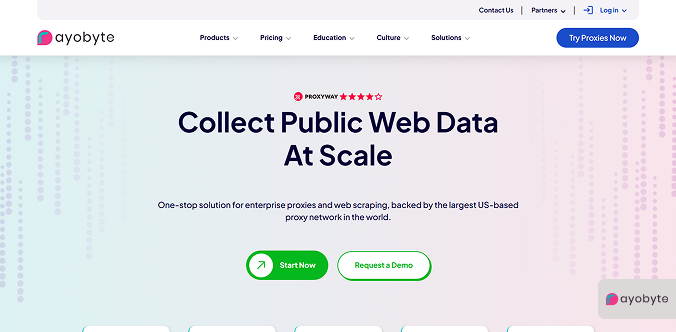
The service has an impressive dedicated pool of 300,000 unique IPs distributed across 9 ASNs, providing exclusive access and enhanced reliability through dedicated proxies. Additionally, it offers a rotating pool of 60,000 shared proxies, ensuring better IP rotation, increased anonymity, and greater flexibility for various online tasks.
With its multiple formats of shared proxies, it gives users more flexibility in how they utilize their connections. It also provides city-level targeting within the US, allowing for precise location-specific access and improved regional targeting for various use cases.
- Good infrastructure and uptime
- Great distribution of IPs across subnets
- Offer a 2-day free trial
- Dashboard isn’t so user-friendly
8. Proxy-Seller
Proxy-Seller provides dedicated datacenter proxies with affordable pricing and solid location coverage on all five continents. They believe in simplicity and reliability without bombarding the user with a feature or pricing list.
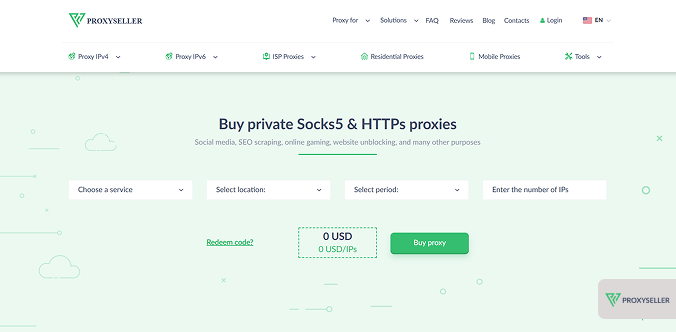
It offers static dedicated proxy lists that include only stable and reliable IPs tailored to your specific needs. With coverage across five continents, you get global reach and diverse IP options. Additionally, the provider offers mixed geographic packages, allowing you to target specific regions or combine IPs from multiple locations for greater flexibility.
With its monthly IP replacements, it ensures consistent security and freshness. It supports a wide range of clients and connection protocols, giving you multiple ways to integrate and use your proxies. Plus, with flexible subscription plans ranging from one week to a full year, you can easily choose an option that best fits your project scope and budget.
- Flexible subscription terms
- Mixed location packages available
- 72-hour refund policy
- No IP rotation features
Best datacenter proxies: Comparison table
We picked and compared all of the top datacenter proxy providers to save you time and stress. The market is already buzzing with lots of options. But this should help you choose the right one.
| Provider | IP Pool size | Locations | Protocols(HTTP (S) & SOCKS5) | Monthly pricing | Perks |
|---|---|---|---|---|---|
| Webshare | 400K (shared) | 50+ | Yes | $2.99 | 10 IPs, 1GB free |
| Oxylabs | 2M (dedicated), 40K (shared) | 188 (dedicated), 24 (shared) | Yes | $6.75 | 7-day business trial |
| Decodo | 100K+ (shared), 500K+ (dedicated) | 16 (shared), US (dedicated) | Available | $3.50 | 14-day money-back |
| IPRoyal | Unspecified | 60+ | Available | $1.57/IP | N/A |
| Bright Data | 770K (dedicated), 100K+ (shared) | 98-100+ | Yes | $2.20/IP | 7-day business trial |
| MarsProxies | 334K+ servers | 37+ | HTTP/HTTPS/SOCKS5 | $0.99/proxy | Free Trial |
| Rayobyte | 300K (dedicated), 60K (shared) | 30 (dedicated), 4 (shared) | Yes | $5.00 | 2-day trial |
| Proxy-Seller | N/A | 40+ | Yes | $0.90/IP | 72-hour refund |
Methodology for selecting a dependable datacenter proxy
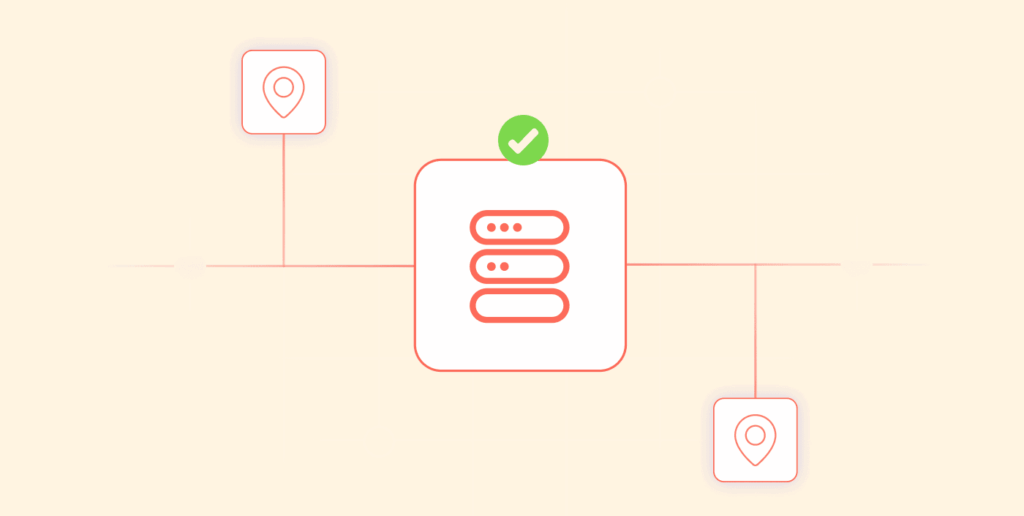
Selecting suitable datacenter proxy providers requires careful consideration of a few fundamental features to ensure they meet your unique needs:
1. Large pool of IPs
The pool of IPs for which each datacenter proxy provider has available for use directly corresponds to your success rates and anonymity. A larger pool means variation in IPs. As a result, you are less likely to get banned and can rotate once you start to scrape.
A sizable pool of IP also provides flexibility for switching IPs as needed throughout the engagement, which is important for activities such as scraping the web, market research, and competitive intelligence gathering. By providing this option, your work can continue without interruptions (due to IP bans).
2. Good performance
The performance and reliability of datacenter proxy providers differentiate good from the best proxy providers. We mean fast connection speed, low latency, as well as efficiency. These are a ‘must-have’ for real-time utility. It can be automated trading, monitoring live data, or collecting data from scraping activities at sensitive time windows.
Reliability means high connection stability with uptime guarantees. Good datacenter proxy providers establish stable connectivity with low rates of data loss or failed connection attempts, operating 24/7 without interruption.
3. Decent pricing
When you are evaluating datacenter proxy providers, how affordable their services are and the pricing flexibility should be one of your primary concerns. There are different kinds of end-users, ranging from occasional use (for personal use) to high-volume commercial use (inconsistent use).
Datacenter proxy providers that offer you payment flexibility (e.g., pay-per-GB, pay-per-IP, or multi-tier subscription packages) empower you to choose the most cost-effective pricing structure. Reputable providers usually have transparent and competitive pricing with no hidden costs; there should be no surprises on your bill.
4. Good security features
Security and privacy should be non-negotiable when considering cheap datacenter proxies. End users depend on proxies to safeguard their IP addresses and secure their online habits from being watched on or interrupted by malicious actors’ attacks.
Users must have trusted and secure proxies that can offer protection through outstanding security protocols, including HTTPS and/or SOCKS5 proxy support. Ethical IP sourcing should also be a top priority, not only for establishing trust but also to help you minimize your potential exposure to legal problems.
The best datacenter proxy providers acquire their IP addresses through legitimate means to provide you with a secure and stable environment for your online activities.
5. Quality customer support
This is the difference between a legitimate professional datacenter proxy provider and an amateur datacenter proxy provider. Sometimes, it’s hard to configure or use proxy services (especially for non-tech users). Users often rely on proxy providers for general setup and continued support on configuration problems and troubleshooting.
Consistent, reliable support available 24/7 can significantly improve your satisfaction with a provider when you need support the most. As an additional convenience, look for multiple support channels (chat, email, phone support) that allow you to quickly obtain help by the method of your choice.
How to set up a datacenter proxy safely
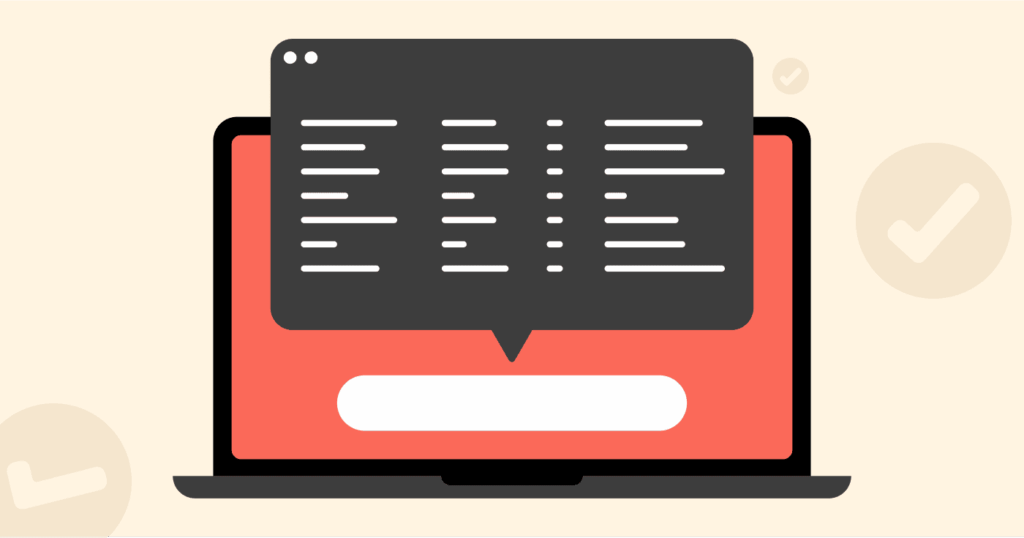
Safely configuring datacenter proxies requires following the appropriate security processes. That’s what guarantees the safety of your data and activities. So what are the steps?
Providers that have established themselves, such as Webshare, Oxylabs, and Decodo, have security practices in place and reliable infrastructure that can secure your operations. Obtain your proxies and configure them based on your unique needs. Most providers have set up documentation for their proxies based on your application and operating systems.
- Implement proper access controls: Do this using username/password authentication or IP allowing to help eliminate unauthorized use and protect your proxy credentials.
- Turn on HTTPS connections to encrypt the data: When you toggle on HTTPS connections, it transforms every data exchange between your devices and your proxy servers into code. This helps protect the sensitive information from being intercepted in transit.
- Conduct routine monthly posts on your proxy logs: At the end of every month, check your proxy logs for any activity that appears out of place and alter the proxy security settings as necessary.
Almost all prominent datacenter proxy providers have tools for monitoring and logging in place. Want to track changes in usage patterns and protocols? This could be your best bet.
Shared vs dedicated datacenter proxies

When choosing a datacenter proxy, one of the first decisions you’ll face is whether to go with shared or dedicated proxies. Both options have their advantages. Shared proxies are more affordable, while dedicated proxies offer exclusivity and performance.
Let’s break down how they differ so you can pick the best fit for your needs:
Shared datacenter proxies
Shared datacenter proxies are a major step up from those sketchy free proxy lists floating around the internet. If you need a free solution for very basic tasks, we’ve listed the 29 best free proxy sites for anonymous surfing in our guide here. However, paid shared proxies actually work reliably and give you breathing room compared to freemium options that throttle you after five minutes.
The trade-off?
You’re sharing those IP addresses with several other users. This isn’t ideal for bandwidth-heavy tasks. But honestly, you might not even notice the difference when browsing smaller websites (or low-load tasks).
However, search engine scraping, accessing sneaker sites, or managing multiple social media accounts are basically off the table with shared IPs. That’s why shared datacenter proxies are several times cheaper than dedicated addresses.
Dedicated datacenter proxies
Dedicated datacenter proxies (or private proxies) are the premium option in the datacenter world. These addresses run on high-end hardware, but the real advantage is exclusivity; you don’t share those IPs with anyone else.
This means better performance and way less risk of getting banned because of someone else’s behavior. They’re the logical choice when shared proxies hit too many blocks, or when you need more control and consistency for your operations (and of course better privacy).
FAQs
Yes, there are several datacenter proxies that offer a free trial or free plan. Webshare has ten free IPs with 1GS monthly usage. Decodo has a 14-day money-back plan. Oxylabs and Bright Data offer a seven-day business. Each provider has a different date, so check each provider to verify their current status of offering a free trial.
Yes, datacenter proxies purchased from trusted proxy providers, such as those in our recommendations, are safe and legal to use for the vast majority of lawful activities, such as web scraping, automatic tasks, and web privacy. They all have professional datacenter proxies with security in place. However, you should avoid using proxies from free or unknown providers because they may put your data at risk or may conduct malicious activities.
Yes, there are free datacenter proxies available for use. However, free datacenter proxies bring serious limitations with things like inadequate speeds, constant downtime, high ban rates, and more. Most importantly, they may put your data at risk while using them. Therefore, free datacenter proxies are only suitable for the simplest tests or the lowest level of activity. If you are considering using datacenter proxies for serious activity, we would highly recommend spending your money on cheap datacenter proxies from a trusted, reputable datacenter proxy location provider. The price you pay will far outweigh the value you get.
